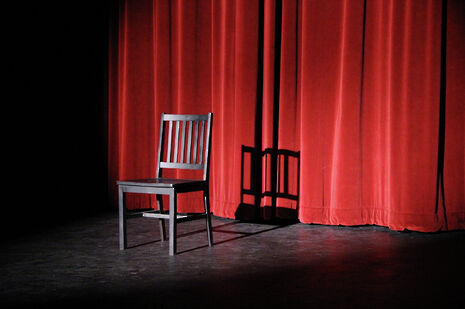Notes from the stage door
“This show was the most complex and frustrating show I have ever worked on.” Floor manager Alex Ridley talks climbing ladders and heaving ropes in pursuit of seamless scene transitions

The simplest of shows put on at the ADC will have one stage manager and a combined lighting and sound op required for each performance. Last term’s How To Succeed in Business Without Really Trying required a stage manager, a deputy stage manager, a floor manager, a head of props, five assistant stage managers, a counterweight op, a follow-spot op, a sound mixer and a lighting op. That’s a grand total of 13 people required backstage for every performance. I was the floor manager, and my job was to work closely with the stage manager to ensure that the set was always where it was meant to be and that scene changes went smoothly, as well as troubleshooting and making sure the cast were always safe on stage.
“There was quite a lot of swearing over cans (the headsets we use to communicate during the show) and a lot of frantic pulling at ropes that simply refused to budge”
This show was the most complex and frustrating show I have ever worked on. It was about five hours into the technical rehearsal on Tuesday morning that we realised we were going to need at least seven people for the most complicated scene change. The best bit, though, was that none of us were ever even going to be seen.
The set designer, James Ireland, had designed an ingenious system in which all of the set was pulled on in grooves in the floor by hidden ropes in different configurations for each scene. I’m sure I lost weight that fortnight with all the ropes I pulled, ladders I climbed and shouting I did! The set was complicated and the scene changes were meant to look smooth and effortless, so I spent a few hours in the middle of the night before our dress rehearsal compiling a multi-page A3 spreadsheet with what was meant to be happening in all locations backstage and onstage at every point of the show.
We did, however, have various necessary stage appearances when things went wrong, there was quite a lot of swearing over cans (the headsets we use to communicate during the show) and a lot of frantic pulling at ropes that simply refused to budge.
But over the days we got better, we fixed things and found ways to make the changes easier. By the second week, it was running smoothly (literally!) and looked fantastic . That’s what is great about backstage work – it’s unpredictable. You have to think on your feet, but also prepare in advance. You get to work with incredibly talented and dedicated people, and you’re bound to get a great sense of camaraderie when you’re all dealing with the same frustrations and successes night after night!
Spending two weeks at the end of term thinking about theatre and helping this show come alive was such a great experience. I would encourage anyone interested in getting involved with backstage theatre to definitely give it a try
 News / Copycat don caught again19 April 2024
News / Copycat don caught again19 April 2024 Theatre / The closest Cambridge comes to a Drama degree 19 April 2024
Theatre / The closest Cambridge comes to a Drama degree 19 April 2024 Interviews / ‘People just walk away’: the sense of exclusion felt by foundation year students19 April 2024
Interviews / ‘People just walk away’: the sense of exclusion felt by foundation year students19 April 2024 News / AMES Faculty accused of ‘toxicity’ as dropout and transfer rates remain high 19 April 2024
News / AMES Faculty accused of ‘toxicity’ as dropout and transfer rates remain high 19 April 2024 News / Acting vice-chancellor paid £234,000 for nine month stint19 April 2024
News / Acting vice-chancellor paid £234,000 for nine month stint19 April 2024




